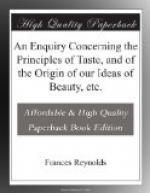And thus the beauty of each sex is seen only through the medium of the virtues belonging to each. The beauty of the masculine sex is seen only through the medium of the masculine virtues; the beauty of the feminine only through the medium of the feminine. The moral sense gives each its distinct portion of the same virtues, but draws a line which neither can pass without a diminution of their specific beauty. The softness and mildness of the feminine expression would be displeasing in a man. The robust and determined expression of the rigid virtues, justice, fortitude, &c. would be displeasing in a woman. However perfect the Form, if an incongruity that touches the well-being of humanity mingles with the idea, the Form will not afford the pleasing perception of beauty: though the eye may be capable of seeing its regularity, &c. so far is it from pleasing, that it is the more disgusting from its semblance to virtue, because that that semblance is a contradiction to her laws.
May it not be owing to these expressions, so familiar to every eye, that the general sense of good taste eternally exists? They are the legible characters of human excellence, no where visible but in the human countenance, every observation of which improves and confirms the moral sentiment, or image of beauty, implanted by nature in the mind of man.
The origin of the idea of beauty is the same in every breast, savage and civilized. Every nation’s characteristic Form or expression of beauty will be a representation, or portrait, of their characteristic virtue, their happiness, their good. Thus, in the opinion of the wild savage, that face or form will be the most beautiful that assimilates with his idea of savage virtues, corporeal strength, courage, &c. perfections that are placed in bones and nerves: as that of the most cultivated nations, witness the Grecians, will indicate or portray the most refined mental virtues. And hence we may conclude, if there be any dignity, any truth, any beauty, in virtue, there must be a real difference, superior and inferior characteristic power of pleasing in the exterior of the human form.
It is cultivation that gives birth to beauty as well as to virtue, by calling forth the visible object to correspond with the invisible intellectual object. In the face or form of an idiot, or the lowest rustic, there is no beauty; and, supposing a nation of idiots, and that they never could improve in mental beauty, they never could, I imagine, improve in corporeal, even though their natural form was upon an equality with the rest of mankind; for, without sentiment, they could not only be incapable of expressing any sentiment analogous to beauty, but, wanting the surrounding influence of a moral system, i.e. of the general influence of education on the exterior, they could not suppress or veil a semblance incongruous with beauty. What no person felt no person could teach.




